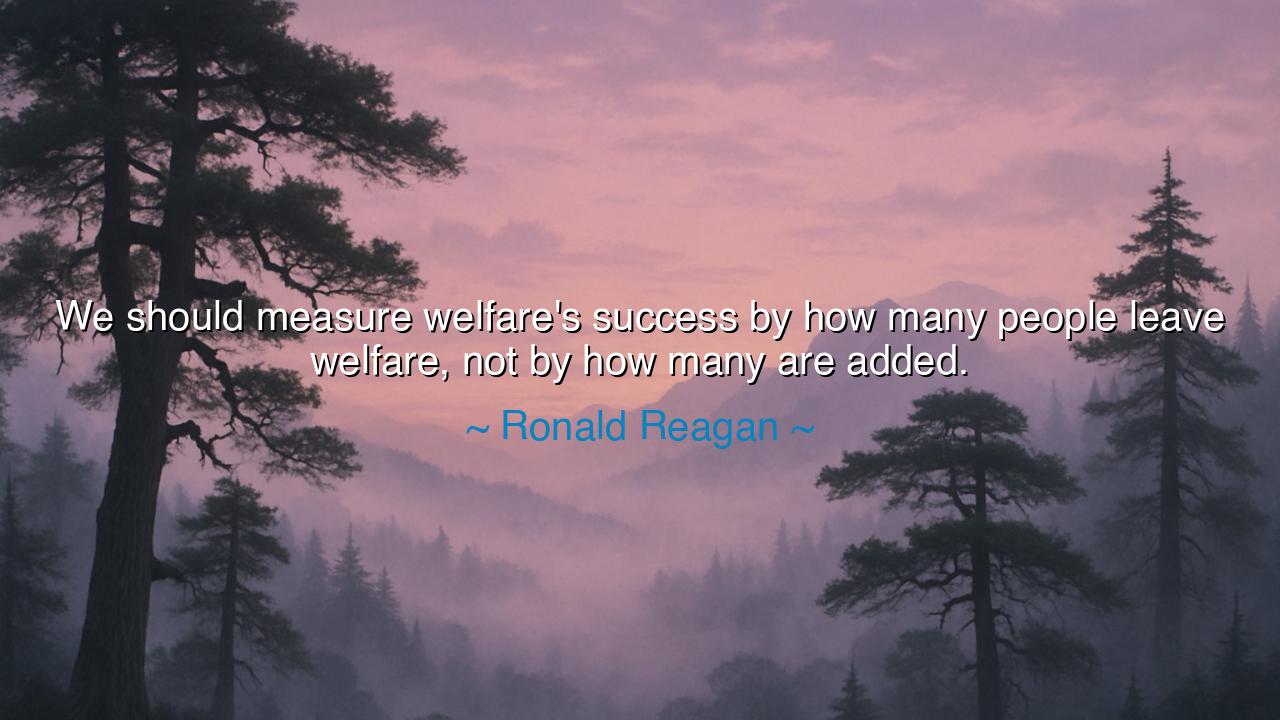
We should measure welfare's success by how many people leave
We should measure welfare's success by how many people leave welfare, not by how many are added.






Hearken, ye wise and the willing, to words born from the marrow of a noble thought—a call to ponder the true meaning of welfare and its guiding light. The sage of the modern age, Ronald Reagan, spoke thus: "We should measure welfare's success by how many people leave welfare, not by how many are added." This proclamation, like a clarion call in the wilderness, echoes with wisdom and passion, for it speaks to the essence of human dignity and the empowerment of the individual.
To understand the depth of this teaching, let us first reflect upon the nature of welfare. In its truest form, it is a beacon for those lost in the storms of hardship, a hand extended to the weary, the downtrodden, and those adrift in the sea of misfortune. It is, as a shepherd’s staff, meant to guide the weak to the path of strength, to give a vessel for survival. Yet, like the shepherd who does not desire his flock to remain in his care forever, so too should we ask, "When is it time to set them free?" Welfare's success, the wise Reagan teaches us, is not in the endless numbers of those it holds but in the uplifting of its people—transforming them from dependence to self-sufficiency.
A parable from our own history comes to mind: There was once a great kingdom where the people, under the yoke of famine and plague, were given the gift of bread—welfare, if you will. Yet, the bread was plentiful and long, and as the years passed, more and more of the people, though they lived well, grew complacent. No longer did they seek to grow their own crops or build their own homes. They became like the reeds in the river—swaying and yielding, but never truly flourishing. The wise ruler of the kingdom, seeing this, declared that their success would not be measured by the bread they had but by how many of his people could stand tall and provide for themselves.
Thus, the ruler set forth a plan to teach the people not merely to accept charity but to rise above their troubles and become self-reliant. He instilled in them the values of work, ambition, and courage, and over time, the once-dependent folk of the kingdom transformed. No longer were they bent under the weight of necessity but emboldened by their own ability to forge their path. And so, the kingdom flourished—not through the endless giving of bread, but through the lifting of hearts and minds to the glory of independence.
And so, too, must we ask ourselves: Are we content in counting how many are fed, or do we long to see how many rise? The path of self-sufficiency is not one of abandonment or neglect, but one of empowerment. Welfare, in this noble context, should not be a permanent state but a passing waystation toward a brighter future—a future where the individual has broken free from the chains of dependency and stands with courage on their own two feet.
In this, there lies a deeper truth. True greatness does not lie in the number of lives one holds in a cradled embrace, but in the number of lives one sets free—freedom to strive, to achieve, and to thrive. The measure of success is not in how many are dependent, but in how many rise above their struggles and take their place in the world, walking with dignity and purpose. It is a reminder that we are not meant to live in perpetual servitude, but to grow, to overcome, and to walk beside one another as equals, not as the dependent and the giver.
Let this teaching stir your hearts, and let it guide your actions. To measure success by how many leave the welfare of dependency is to understand the noble aim of human flourishing. You are not meant to be a passive recipient of handouts; you are meant to be a force of life, capable of creating, building, and contributing. Rise from the ashes of hardship, and with sweat on your brow and a fierce will, take the reins of your destiny.
As we pass these lessons to the generations that follow, let us take heed of the words of the great sage, and let us walk the path of self-sufficiency, dignity, and empowerment. Let the welfare state not be an end, but a beginning. Rise from it, and rise with purpose—become the masters of your fate. And as you do, remember: success is not in the number of hands that reach out, but in the number that can stand tall and reach forward.






AAdministratorAdministrator
Welcome, honored guests. Please leave a comment, we will respond soon